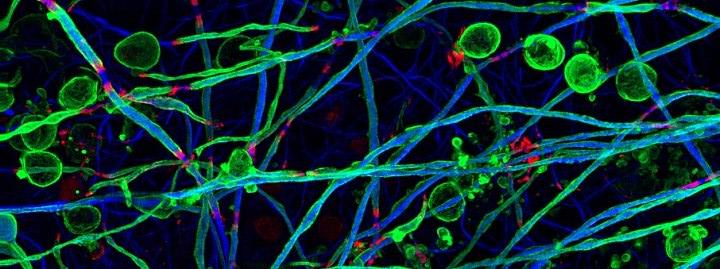 MS Society UK @mssocietyuk · Apr 17
MS Society UK @mssocietyuk · Apr 17Positive results from early trials into nerve cell protection &myelin repair in optic neuritis http://bit.ly/1HzB6ha
Optic neuritis trials: encouraging results announced
Published date: 16 Apr 2015 at 5:56PM
Positive results from two separate phase two clinical trials in optic neuritis will be announced at the American Academy of Neurology’s 67th Annual Meeting in Washington next week.
The two drugs, known as phenytoin and anti-LINGO-1, have been shown to have a positive effect in optic neuritis, a condition that around half of people with MS experience.
Optic neuritis is caused by inflammation and damage to the nerves carrying information between the eye and the brain, and can result in sudden blurred vision and partial or even total blindness.
Phenytoin – protecting nerve cells
The drug phenytoin is commonly taken to prevent epileptic seizures, but may also protect nerves from damage according to results announced from a new phase two clinical trial.
Dr Raj Kapoor led the trial at University College London (UCL), which recruited 86 people who were experiencing early symptoms of acute optic neuritis. Participants were given either phenytoin or a placebo drug for a three month period. The team then assessed whether the drug could help to protect the retina (the light sensitive nerve layer at the back of the eye) from damage by measuring the thickness of the retinal nerve fibre layer, once at the beginning of the study, and again six months later.
Findings
The team found that:
- The group who took phenytoin had 30% less damage to the retinal nerve fibre layer compared to those who received the placebo
- The volume of the macula, the most light-sensitive part of the retina, was 34% higher in those who took phenytoin than those who received the placebo
Most people recover vision from their first episode of optic neuritis and in this trial there weren’t any significant differences found in the long term visual outcomes between the two groups.
Promising results
Dr Raj Kapoor, MD, at the University College London Hospital, said: “These are promising results and if our findings are confirmed by larger studies, could lead to a new treatment that protects nerves from the damage caused both in optic neuritis and throughout the central nervous system in MS.”
The study was co-funded by the MS Society, the National Multiple Sclerosis Society, an unrestricted grant from Novartis, the National Institute for Health Research Clinical Research Network and University College London Hospitals Biomedical Research Center.
Anti-LINGO-1 – repairing myelin
The RENEW trial tested the drug anti-LINGO-1, which is under development by Biogen and has been shown to promote myelin repair in an animal model of MS.
The trial involved 82 participants with a first episode of acute optic neuritis, who were given anti-LINGO-1 or a placebo infusion. Researchers measured the time it took for nerve impulses to travel from the retina to the brain and found that in the group that took anti-LINGO-1, there was an improvement in this signaling time, suggesting that remyelination is happening in these people.
Encouraging news
Dr Emma Gray, Head of Biomedical Research at the MS Society said:
“This is the first indication that a drug could promote remyelination in people, which is hugely encouraging news. People with MS are in desperate need of treatments that slow or halt the progression the condition, and repairing myelin is a promising way to do this.
"These trial results in optic neuritis represent another positive step towards developing myelin repair treatments for people with MS.”
Next steps
These announcements are the first time the new results have been shown to the research community, and they will now need to be published in a peer-reviewed journal where they will be scrutinised by the scientific community.
It’s not yet clear that the improvements seen in these trials could actually correlate to slowing of progression; larger and longer clinical trials would be required to demonstrate this.
A phase 2 trial of anti-LINGO-1is ongoing in relapsing remitting MS andsecondary progressive MS, and is expected to finish expected early next year.
Read more about anti-LINGO-1 and phenytoin.

No comments:
Post a Comment